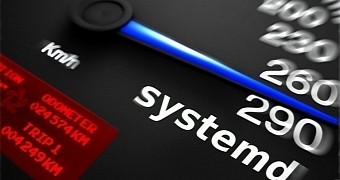It has been three long months since systemd 228 was released to the open-source community, and today we're glad to inform you that the controversial software has received a new major update.
systemd 229 has been announced by its creator, Lennart Poettering, earlier today, February 11, and it packs a lot of new features, as well as the usual under-the-hood tweaks and bugfixes.
The main attraction of this release, though, is systemd-resolved, the DNS resolver service, which has received quite a bunch of new features. Among the most important ones is support for using it as a DNSSEC validating stub resolver.
"DNSSEC mode is currently turned off by default, but it is expected that this is turned on by default in one of the next releases," says Lennart Poettering. "For now, we invite everybody to test the DNSSEC logic by setting DNSSEC=allow-downgrade in /etc/systemd/resolved.conf."
What's new in systemd 229
systemd 229 release highlights include systemd-resolve improvements, support for /dev/disk/by-path/ symlinks for virtio devices, rewritten coredump collection logic, as well as support for SOCK_SEQPACKET and SOCK_DGRAM sockets in systemd-activate.
Moreover, a new $SYSTEMD_COLORS environment variable is now honored by most systemd tools, the PortRange= and DestinationPort= settings have been added for VXLAN support in networkd, and there's a new systemd.machine_id= kernel command-line switch available.
The -as-pid2 and --chdir= switches have been added to systemd-nspawn, the "journalctl /dev/sda" command is now capable of outputting all kernel log messages from the respective device, and two new calls have been added to the sd-journal API.
Last but not least, there's a new --fields switch available for journalctl, along with a new service setting called AmbientCapabilities=, "systemctl reload-or-try-restart" has been renamed to "systemctl try-reload-or-restart," and socket units now support listening on UDP and SCTP protocol sockets.
You can download the systemd 229 sources right now via our website, but we strongly recommend that you update your GNU/Linux operating system as soon as possible, as the new version should arrive in the default software repositories. Below we've attached the entire changelog for those curious to know what exactly has been changed.

 14 DAY TRIAL //
14 DAY TRIAL //